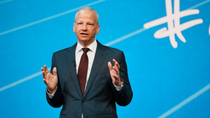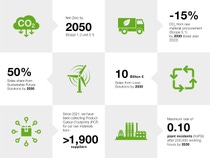Sustainability
In a nutshell: Sustainability at BASF
Why does the world need BASF? Our answer: We create chemistry for a sustainable future. We want to use chemistry to contribute to a world that offers a better quality of life for everyone. In such a world, the economy, the environment and our society must be kept in balance. That is the core of sustainable development. And that requires constant change from people and organizations. BASF has been changing continuously for more than 150 years. Today, change means above all that we want to be the preferred chemical company to enable our customers' green transformation.
Our customers are taking different paths in their transformation. Priorities and pace vary from region to region and from industry to industry. We have to take this into account and carefully consider which products and technologies to invest in and when.
We focus on where we can create the most value. We have everything we need to do this: high-performance facilities, significant amounts of renewable energy, access to alternative raw materials, and the knowledge of how to best combine these building blocks. This ensures that every customer receives the product that fits their transformation path.

BASF develops and offers solutions that minimize negative impact on environment and society while maximizing positive results. This includes reducing CO2 emissions, conserving resources, and using renewable energy and raw materials from renewable sources. We have set ourselves specific targets to achieve this. For example, we aim to achieve net zero greenhouse gas emissions by 2050. Selected sustainability goals can be found here:

Scope 1, direct emissions: These are CO2 emissions generated directly at our own sites, for example by production facilities or our own power plants.
Scope 2, indirect emissions from purchased energy, arise when other companies generate energy that you use yourself.
Scope 3, indirect emissions along the upstream and downstream value chain: e.g., all CO2 emissions generated during the manufacture of intermediate products or during transport.
Scope 3.1, sub-area of Scope 3: specific CO2 emissions from the procurement of raw materials.
Sustainable development is of strategic importance for BASF. It guides our decisions on what and how we purchase, what and how we produce and sell, and how we manage the company as a whole. Examples of this can be found throughout our management processes: from supply chain management to the management of our product portfolio and our environmental management to our reporting, human rights responsibility and stakeholder engagement. We focus on key sustainability topics that we identify through regular analyses.
This shows that BASF aligns its core processes with sustainability. A central idea here is that we consider social, ecological, and economic criteria to be of equal importance. This is neither easy nor free of conflicting objectives. That is why rules must be negotiated at a societal level. We see it as part of our responsibility to actively engage in social and political discussions. It is important that the various interest groups agree on a common, reliable framework. We are, for example, committed to the Paris Climate Agreement.
An overview of our political positions on selected sustainability topics can be found here:
We also participate in political discourse because, as a commercial enterprise, we are part of society and want to take responsibility for it. In addition, we are primarily involved in the areas of education, health, and disaster relief. Our social responsibility is based on respect for human rights. It is a central component of our own values and standards and thus of our corporate governance.
We listen carefully to what social and political actors are calling for. We contribute both our knowledge and our questions to the dialogue, especially with representatives of critical interest groups. We take great care to track the life cycle of products from production to use. Above all, we want to offer solutions for green transformation. These levers are particularly powerful in the areas of climate protection and circular economy.
Climate protection is one of the most pressing tasks humanity is facing. Of course, we cannot determine the pace alone: everyone is called upon to act – markets, investors, political regulation, civil society, and end consumers. We want to be part of the solution. That is why we are committed to an objective and constructive dialogue.
In this dialogue, we promote a fundamental understanding of sustainable development: social, ecological and economic factors are not mutually exclusive, but rather interdependent. Like any other company, BASF can only commit to the environment and society if it is also economically successful.






